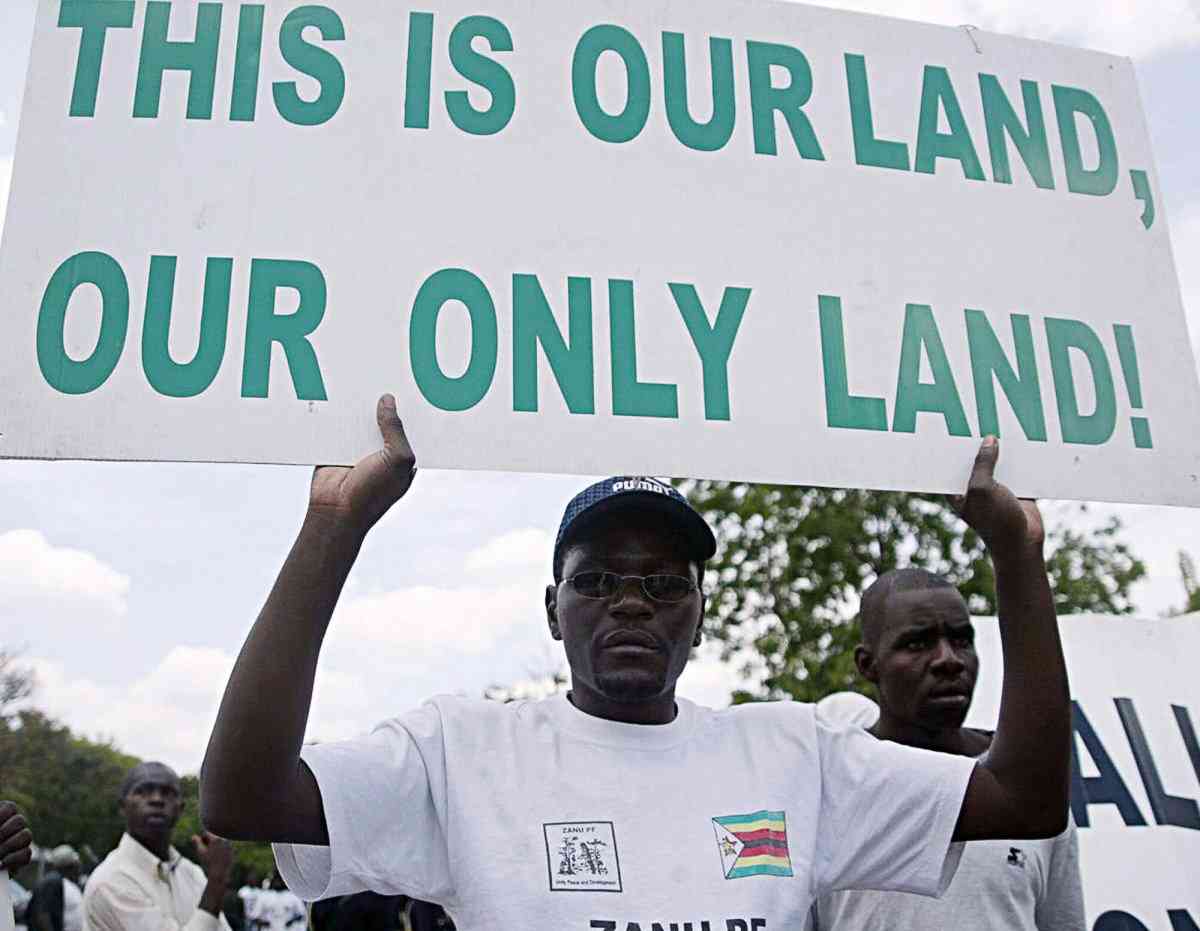
BEFORE the year 2000, agriculture accounted for between 9-15% of Zimbabwe’s total economic activity (GDP) and as much as 20-33% of export earnings.
Additionally, it (agriculture) contributed over 60% of raw materials used by local agro-industries,such as textiles, paper, sugar, diary products, cooking oil,leather, food processing, agro inputs and chemicals, etc.
Also, more than 70% of Zimbabweans derived their livelihoods from the sector. At the time, land ownership was dominated by about 6000 white commercial farmers and a few foreign and national (mostly government-owned) agro-industrial estates, which had access to prime farming land.
The country also had peasant (subsistence) and small scale farmers, who played a lesser although significant role, in ensuring food security. In the first decade after independence (of 1980), the British government used to fund the purchase of farmland from white farmers for the relocation of black Zimbabweans, since that was part of the deal made during the negotiations for Zimbabwe's independence at Lancaster House (in London).
Unfortunately, the British failed to continue honouring the pledge of funding orderly land reform in Zimbabwe. Only £44 million (or US$55,44 million) in aid, was provided in the years after independence.
By 1997, Clare Short, the-then British International Development Secretary, declared that the responsibility of funding Zimbabwe’s land reform was no longer upon her government. This motivated the widespread farm seizures (land reform)of the year 2000.
Immediately after the seizures, agricultural production took a downward dive and only began to selectively recover from 2006. The recovery eventually led to a record tobacco harvest in 2023 of 296 tonnes.
There was also wheat self-sufficiency, with a harvest of over 465 000 tonnes in 2023, and a bumper maize harvest of 2,7 million tonnes in 2021.
- Experts downbeat as Ncube cuts GDP forecasts
- New perspectives: De-link politics from Zim’s education policies
- Experts downbeat as Ncube cuts GDP forecasts
- New perspectives: De-link politics from Zim’s education policies
Keep Reading
However, since the land reform was fast-tracked and contested even on some international platforms, it came at the cost of capital (foreign direct investment, foreign stock exchange participation, foreign money market and bond investments) flight, the depreciation of the Zimbabwe dollar, hyperinflation, trade and financial sanctions invoked by the United States of America (USA) and Europe, food insecurity, etc.
Without taking away from the gains of some productive farmers and the vision of the political leadership to empower black Zimbabweans, it is essential to initiate the discussion on what the future should look like, in the context of the country’s land reform of the year 2000.
Urban land reform
It is essential to remember that an orderly land reform is also crucial in the urban areas. There is currently a strong demand for low-cost urban housing, due to the rapid urbanisation taking place.
The situation is likely to get even more severe in the next few years. A failure to provide such housing solutions may lead to the sprouting of more informal settlements.
If the government fails to provide housing solutions in urban areas, it may eventually have to accept some of the informal settlements and formally acknowledge them through upgrading them in situ(in their original place).
Although some policy-makers may choose to ignore the dangerof dominant and unmanageable informal settlements, their existence cannot be wished away and will increasingly manifest as the years go by and if poverty in the urban areas persists.
This means that the government has the responsibility to ensure that the economy grows at a pace, which enables people to afford housing and to remain with the dignity to decline living in informal settlements and slums.
Rural land reform
In the rural areas, the government needs to contemplate the provision of title deeds to rural dwellers. If an approximate valuation can be established for rural residential and farm land in each respective rural district, villagers willing to acquire title deeds for their land should be allowed to pay the respective price for it.
Of course, this process should ideally follow the appropriate zoning of the land, so that only those areas feasible for farming and residencies are able to get the secure tenure (title deeds).
Such a stance is good in that it may slow down the rapid urbanisation, which is adding pressure to public services in the cities and towns.
It may be that in just a few years from now, some cities will begin to experience a greater breakdown of water reticulation, sewage, electricity, roads and other infrastructure due to the presence of urban populations beyond the capacity of city authorities and infrastructure.
Secondly, with secure tenure (title deeds), rural land will have greater commercial value and can be used to borrow productive loans from banks and other pertinent institutions.
This will enable the villagers to increase their investments in village farming activities. In order to unlock more value out of the communal lands, a collateral (asset) registry, which has details on assets, such as cattle and other small value items can be created for each village and rural district.
The villagers can then use the assets as security when borrowing from banks and other micro-credit institutions.
The borrowing can be permitted for only business activities and with a modest (small) limit for farmers with no credit history (a recorded history of handling money well), in order to encourage entrepreneurship and reduce the appetite for risk on the part of both the villagers and the banks.
The registry can be updated as regularly as, within each seven days, in order to quickly identify changes in asset ownership of the villagers. New jobs can be created through this procedure.
Also, the regular updating of such collateral (asset) registries can reduce stock theft, since it will make owners of livestock and their respective communities, treat the livestock with a greater level of formality and seriousness (solemnity).
With such credit mechanisms available, villagers may then be able to independently establish greenhouses, grow high value crops or enter into lucrative agricultural enterprises, which serve both the local and export markets.
Agrarian land reform
The state should also determine to issue title deeds for the redistributed land (of the year 2000), some of which has tenure in the form of 99-year leases.
Title deeds will similarly enable the farmers to borrow from banks and get investment partners, who will be able to spend on infrastructure and other farm improvements.
This will be essentialsince commercial agriculture is a capital-intensive expedition. In other words, it is almost impossible for farmers to practice modern commercial agriculture without high capital (financial and infrastructural) investments.
The government may also provide thetitle deeds at a price, thereby, effectively sell the land to the beneficiaries of the land reform programme.
Ideally, the price for the deeds can be set at 50% or 75% of the market value of the land. This means that farmers who pay for the full price after a certain number of years (perhaps 25 years, or earlier for those who can afford), will then be able to access title deeds for their land.
Looking at the fact that it is more than 20 years since the beneficiary farmers have been resettled, it is not crudely unfair to expect them to pay for the land. If they have not been profitable all through the 24 years (after land reform) and they cannot pay for the title deeds that also means that they are a risk to the country's food security and economic development.
The revenue, which the government earns from the title deed sales, can then be used to repay the former white commercial farmers, whom the government committed to compensate an amount of US$3,5 billion for their dispossession in the year 2000.
It is also likely that once the land has to be paid for in yearly instalments (by resettled farmers), the unsuccessful farmers will sell or surrender their farms so that the more successful ones will purchase or take upthe land which they would have surrendered.
The result would be that there would be a greater consolidation of farms and a higher frequency of larger farms instead of smaller farms in the country.
Once title deeds are issued to the farmers, the government can also place a five-year moratorium (temporary ban) on the allowed time period for the farm owner to sell the farm (that is if they happen to want to sell).
The government can also have the “first right of refusal” upon the sale of the farms (which have title deeds), in order to ensure that land remains in black ownership as targeted by the government.
The government’s “first right of refusal” can also be invoked when banks need to repossess the land. In other words, the government should act as a guarantor of loans taken by black farmers, from commercial banks, once title deeds have been issued.
However, knowing that there is limited financial capacity on the part of the Ministry of Finance, the Treasury will have to coordinate with banks so that the number of loans, which it can guarantee for each year are known beforehand.
That means if the ministry can only guarantee loans worth US$200 million for a particular cropping season, banks will only issue that much (US$200 million) in loans to the resettled farmersthat use their title deeds as collateral.
After a while, some farmers with title deeds should then be permitted to borrow outside of the government guarantees, at the risk of losing their farms to the banks and the private buyers to whom the banks will auction the farms to, if there is a failure to repay their loans.
This also necessitates the need for strong monitoring mechanisms by government so that borrowed funds are used accordingly. Any diversion of loans to non-agricultural activities should result in serious legal consequences for the rogue farmers.
More irrigation, water harvesting and infrastructure grants from government will also be essential in the quest to empower the current black farmers.
Land reform should also be viewed in terms of the development of black-owned agro-processing firms. Meaning that investments into such activities (agro-processing) should be a priority.
It is also essential to ensure that land (or title deeds) is not given to anyone simply because of their demographic (race, gender, age, etc) status. Rather, it should be given to people who have proven a level of skill, dexterity, technical ability, entrepreneurial aptitude or past successes. This is critical because land is a productive resource and once in the wrong hands, it can worsen economic challenges and food insecurity on a national level.
Therefore, empowerment policies should not take priority over productivity and sensible economic reasoning. It will be a good reminder to note that, even in pre-colonial times, the poor were still there.
Thus, it will not be feasible to try and empower every disadvantaged person, although the government might have the desire to do so. On that same note, farmers who are unproductive should be identified so that they are replaced with citizens, who have the potential and financial means to outmatch them.
Conclusion
Ultimately, the government should aim to ensure that the national debate and ongoing implementation of the land reform do not become a “zero sum game” whereby- some citizens have to lose in order for others to gain. Resettled farmers should, therefore,prove their worthiness by being productive. As their productivity feeds into overall economic growth, the whole nation will benefit. Without that, it may be time to replace the unproductive landbeneficiaries with a newset of farmers.
- Tutani is a political economy analyst — tutanikevin@gmail.com






